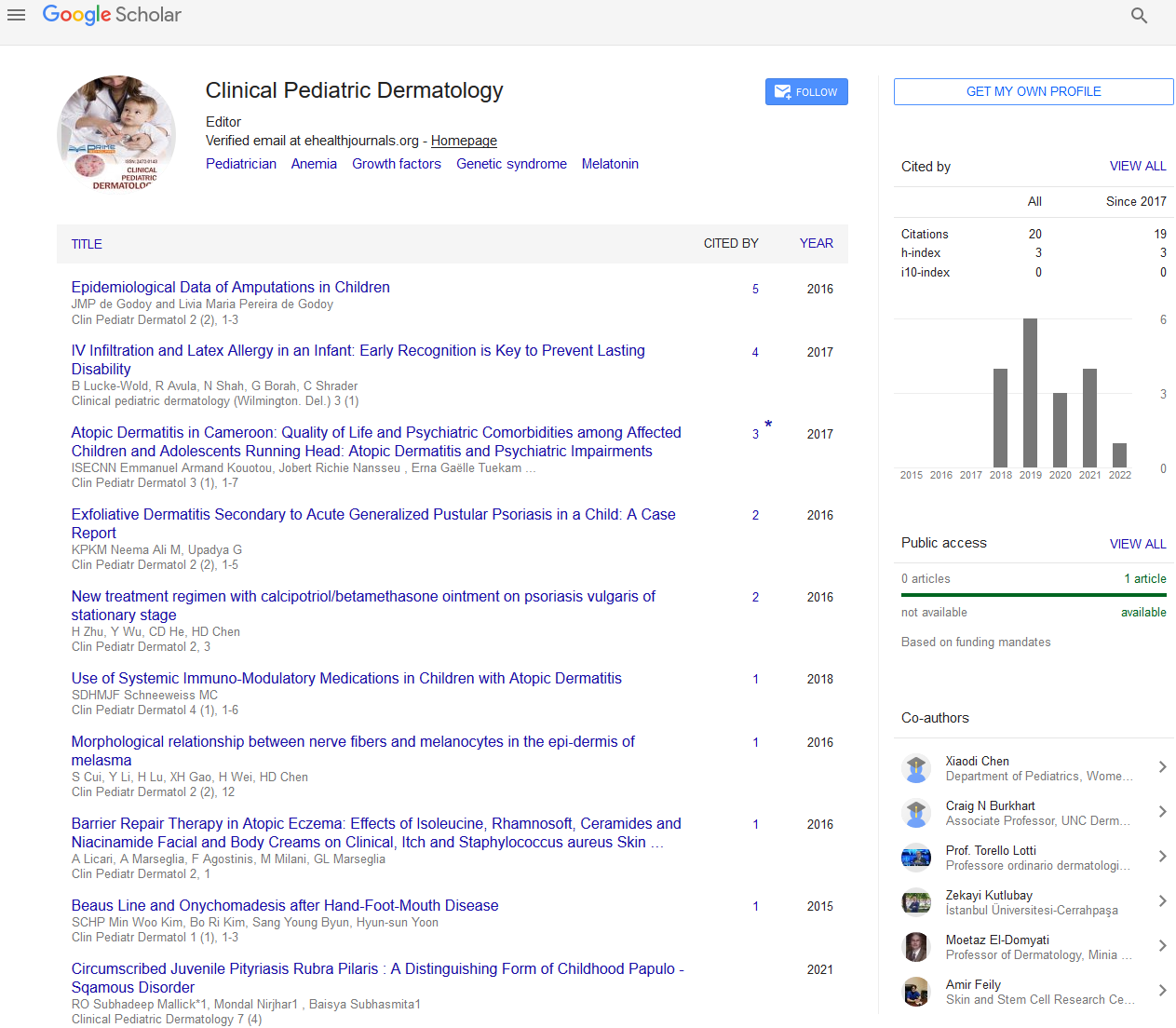Commentary - (2023) Volume 9, Issue 4
Resistance Investigation Utilizing Skin Demonstrate Shapes and Direct Complementarity Conditions
Shah Ira*
Department of Pediatrics, Christian Medical College, India
*Correspondence:
Shah Ira,
Department of Pediatrics, Christian Medical College,
India,
Email:
Received: 29-Nov-2023, Manuscript No. IPCPDR-23-18665;
Editor assigned: 01-Dec-2023, Pre QC No. IPCPDR-23-18665 (PQ);
Reviewed: 15-Dec-2023, QC No. IPCPDR-23-18665;
Revised: 20-Dec-2023, Manuscript No. IPCPDR-23-18665 (R);
Published:
27-Dec-2023, DOI: 10.36648/2472-0143.9.4.34
Description
The skin, our body’s largest organ, serves as a protective barrier
between our internal systems and the external environment. It
shields us from harmful pathogens, regulates body temperature,
and plays a crucial role in sensory perception. However, an array
of conditions can affect the skin, impacting its health, appearance,
and functionality. This article aims to explore the diverse landscape
of skin conditions, shedding light on their types, causes,
treatments, and the importance of skin health. Skin conditions
encompass a broad spectrum of disorders that affect the skin’s
structure, texture, colour, and overall integrity. These conditions
can be classified into various categories based on their causes,
manifestations, and affected layers of the skin: This category includes
conditions such as eczema (atopic dermatitis), psoriasis,
and acne. Inflammatory skin conditions often involve immune system
responses, leading to redness, itching, and skin lesions. Conditions
like fungal infections (such as ringworm), bacterial infections
(like impetigo), and viral infections (such as herpes) affect the skin
through microbial invasion, resulting in various symptoms and lesions.
Allergies can trigger skin reactions, including hives, contact
dermatitis, and allergic eczema. These conditions arise when the
immune system reacts to specific allergens upon contact with the
skin. Conditions like rosacea, vitiligo, and hidradenitis supportive
are chronic, long-lasting conditions that often require ongoing
management and can significantly impact a person’s quality of life.
Skin conditions have diverse etiologist, with causes ranging from
genetics and environmental factors to lifestyle choices and underlying
health conditions: Many skin conditions, such as psoriasis and
eczema, have a genetic component, making individuals more susceptible
to developing these conditions if they have a family history.
Exposure to irritants, pollutants, Ultraviolet (UV) radiation, or
certain chemicals can trigger or exacerbate skin conditions, leading
to flare-ups or worsening symptoms. Factors like stress, smoking,
poor diet, inadequate skincare routines, and excessive sun exposure
can contribute to the development or aggravation of various
skin conditions. Certain systemic diseases, hormonal imbalances,
or immune disorders can manifest as skin conditions, reflecting
internal health issues that require specific medical attention. The
management of skin conditions often involves a multifaceted approach
that addresses symptoms, triggers, and underlying causes:
Topical creams, ointments, or lotions containing corticosteroids,
antibiotics, antifungals, or other active ingredients are commonly
used to alleviate symptoms and manage skin conditions. In cases
where topical treatments aren’t sufficient, oral medications, such
as antihistamines, antibiotics, immunosuppressants, or retinoid,
may be prescribed to target the condition internally. Lifestyle
changes, including stress management, dietary adjustments, skincare
regimens, and avoiding triggers, play a pivotal role in managing
and preventing recurrent skin conditions. For severe or chronic
conditions, advanced treatments like phototherapy, laser therapy,
or biologic medications may be recommended by dermatologists
to achieve better control and relief. Maintaining skin health goes
beyond treating existing conditions; it involves adopting proactive
measures to promote healthy skin: Consistent skincare practices,
including cleansing, moisturizing, sun protection, and using suitable
products for one’s skin type, are fundamental for maintaining
skin health. A balanced diet rich in nutrients, adequate hydration,
regular exercise, stress management, and adequate sleep contribute
to overall skin health and vitality. Periodic skin evaluations by
dermatologists can aid in early detection of potential issues, allowing
for timely intervention and prevention of serious skin conditions.
Acknowledgement
None.
Conflict Of Interest
The author’s declared that they have no conflict of interest.
Citation: Ira S (2023) Resistance Investigation Utilizing Skin Demonstrate Shapes and Direct Complementarity Conditions. Clin Pediatr Dermatol. 9:34.
Copyright: © 2023 Ira S. This is an open-access article distributed under the terms of the Creative Commons Attribution License, which permits unrestricted use, distribution, and reproduction in any medium, provided the original author and source are credited.

